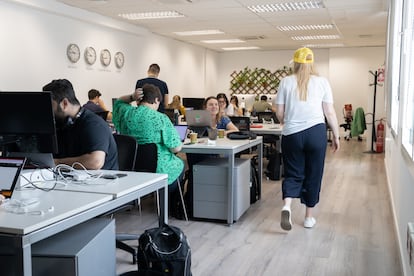The four-day working week: ‘They’d have to pay me double to go back to the old schedule’
The concept is slowly gaining ground in Spain, which could soon launch a government-sponsored trial. Other countries have introduced similar projects

Sara Cabrerizo, 25, looks forward to Mondays. “I get up late on Mondays, which is a dream. I go to the gym or swimming with my mother and I run errands – whatever needs doing,” she says from the headquarters of Good Rebels in Madrid.
This digital marketing agency is one of the few companies in Spain to apply a four-day week – 32 hours as opposed to 40. “My life has totally changed for the better,” she adds. Her colleague, Inés Aguilar, 25, has had Fridays off since last year and is similarly delighted: “I’m less stressed and I can do things I didn’t have time to do before, like learning Italian.” Both are paid the same as when they worked a five-day week.
Iliana del Barrio, 39, has two young children and also works four days a week. “Friday is my day to do whatever I feel like,” she says. “Before, if I wanted to go to the hairdresser or whatever, I had to leave the kids with their grandmothers. I have a much better work-life balance.” Iliana works for EMA Competición, a motorcycle mechanics academy in Málaga that introduced the four-day week back in 2019. “It’s marvelous,” she adds.
Workers at the Granada-based Grupo Deluxe, a company dedicated to water treatment products, are equally convinced. “They would have to pay me twice as much to go to another company,” says Verónica Ávila, 40. “You don’t know what a downer it would be to go back to a five-day week.” Meanwhile, salesmen, Benito Valenzuela, 51, says, “Until I win the lottery, I’m not leaving here. Thursday is a good day to end the week.”
But the four-day week is making very slow progress in Spain: so far fewer than 24 companies reported having switched. The Ministry of Industry has embarked on a procedure for 150 companies to test out the four-day week while maintaining the same salary – in companies such as Telefónica or Desigual, the four-day week exists on reduced wages. The left-wing party Más País is behind the €10 million initiative, having made it a condition of its support for the national budget. The details are expected to be published before the end of the summer, according to Industry Ministry sources. The initial proposal is that a subsidy of between €2,000 and €3,000 per worker will be given to collaborating companies, especially those falling within the small and medium-sized category. The aim is to test whether the reduction in working hours on the same salary maintains the companies’ productivity and profits.
Similar initiatives are underway in other countries. In the UK, 73 companies, with a total of 3,000 employees, will apply the 100-80-100 scheme, i.e. 100% salary, 80% working time and 100% effectiveness over a period of six months. Researchers from several universities, such as Cambridge and Oxford, will also observe the response of employees with regard to added stress, job satisfaction, health, sleep and levels of well-being.
Exacerbating stress levels is one of the main risks flagged up by the proposal’s detractors. “Personally, it’s not my case, but I understand that it can stress some people out a little more,” says Juanmi Díez, 33, an employee at Good Rebels, who initially doubted that the project would prosper: “At first, I thought it was nonsense because we already had enough freedom to manage our time. I was wrong. Either you get yourself in the mindset that you don’t work on Friday or you don’t get colleagues and your customers used to it.”
“On balance, it pays off to squeeze in a little more. It’s a great advantage,” says Reinaldo Ortega, 25, one of the teachers at the Málaga academy.
Joan Sanchis, associate professor of applied economics at the University of Valencia and advisor to the Valencian regional government’s Department of Sustainable Economy, believes that if the worker is feeling more pressure, the company is not applying the four-day week correctly. “If people are going to be more tired, then there’s no point,” says Sanchis, who has written a book on the subject. “The important thing is to address inefficient practices in order to have an impact on productivity. We can do the same thing in less time without burdening the worker.” Sanchis uses OECD (Organisation for Economic Co-operation and Development) data to justify his assertion: Spanish employees are among those who spend the most hours at the office, but their productivity is low compared to countries such as Germany and the UK.
In Spain, people work an average of 1,577 hours a year, 245 more than in Germany and 210 more than in the UK, but these countries generate more wealth. The difference, however, is partly due to the fact that richer countries tend to have a more technical and industrial economy with larger companies, while in economies such as Spain, labor-intensive sectors are more important and the vast majority of companies are small or medium-sized.
Producing the same in fewer hours
Can the same amount of work be done in fewer hours? The software company Delsol, in Spain’s southern province of Jaén, was a pioneer in applying the four-day week in Spain. It introduced the measure in January 2020 and hired more staff to implement the system. “The workforce went from 160 to 185 people to spread the workload and provide the same service to the customer,” explains human resources manager Ana Arroyo, who adds that from the beginning the company’s goal was to promote work-life balance. “The week can feel more intense, but it’s doable and it pays off.”
Joan Sanchis explains that in shift-based companies common to the hospitality or industrial sectors, implementing the four-day week requires more staff, but in others with a more creative character, it may not be necessary. “It’s about better organization and less procrastination,” says Joel Calafell, 34, from Good Rebels. “You become more efficient. For example, meetings are more concrete and there are things we used to see each other about that can now be solved with an email.”
Delsol’s staff works Monday through Thursday, except for employees dealing with the public, who take turns providing a service on all five working days. To make the most of their time, some changes have been introduced, such as reducing the lunch break from an hour and a half to an hour and trying to limit meetings to 20 minutes. Rocío Ramos, 41, who works in customer service, doesn’t think the job is more stressful but she does say that, at the beginning, “it’s more intense.” However, being able to recharge your batteries for a day makes it worth it. “If we had to go back after five days... we’d be gutted,” she jokes.

Delsol already has data to back its strategy. Two and a half years after launching the four-day week, employee and customer surveys indicate a clear improvement in the working environment and quality of service, according to Ana Arroyo. And the company has increased turnover by 20%.
The goal of work-life balance was also what led Daniel Magaz, 47, manager of the Galician company Toldos Porriño, to implement the four-day week in September 2021. “We work nine hours a day – that is 36 hours a week– in shifts from Monday to Thursday and Tuesday to Friday,” he explains. He has not reduced the salaries of the 11 workers who make up his staff, but he had to hire one more person to balance the shifts. “I worked in a bank for many years and put in a lot of hours, but when I founded my company in 2013 my idea was to combine economic and social benefits because I prefer to earn a little less and work a little less too,” he explains. “The four-day week is more intense, but people are more focused and there is less downtime. I think things are going well. We haven’t noticed any loss in productivity.”
It remains to be seen whether this type of initiative is only viable in companies that are already doing well, do not have large workforces and whose owners are sensitive to work-life balance issues, or whether it can be generalized. Unions and employers in Spain agree that it’s not yet on the table for public debate.
There are also highly questionable models, such as the one in place in Belgium, where the government is preparing a labor reform subject to agreement between business leaders and the unions, which would allow for a four-day week but with the same hours, meaning working days of between 9.5 and 10 hours a day.
One success story is Iceland, which between 2015 and 2019 conducted an experiment to pay employees the same for a four-day week and found productivity either maintained or improved. Eighty-six percent of the Icelandic workforce has adopted the new schedule or is eligible to do so.
Some pilot schemes have also been carried out in New Zealand but the results have not always been as positive. A study by Auckland University professors Helen Delaney and Catherine Casey found that, after the change in working hours, some employees felt that work was more stressful and that they were under more pressure from their superiors to meet targets. There were fewer breaks and less socializing, which for some was perfect while others were left feeling exhausted.
“I don’t know how fast this is going to be implemented,” says Kike Valdenebro, 49, a partner at Good Rebels. “I don’t know if we’re going to see it in 20 years or it’s going to take a generation, like the two-day weekend which suddenly became commonplace. But I think it’s unstoppable. In two decades, I think it will seem normal for us to work four days.” Kike is clear that companies that implement this model have an “unbeatable” advantage in recruiting staff: “It is easier to attract talent when you offer flexibility,” he adds.
“The fundamental question,” Sanchis concludes, “is to review the role of work in our lives and to talk about our right to time. The economic reality is changing. Right now, the four-day working week may seem anecdotal but, since the pandemic, it has been catching on very quickly – the pandemic has made us rethink almost everything. It is possible to work in a different way, and this realization is giving rise to an alternative to being on-site and putting in meaningless hours.” At the end of the day, it seems to be about dedicating less time to the lunch break, promoting a hybrid work model and asking oneself before calling a meeting: could this be solved with an e-mail?
Tu suscripción se está usando en otro dispositivo
¿Quieres añadir otro usuario a tu suscripción?
Si continúas leyendo en este dispositivo, no se podrá leer en el otro.
FlechaTu suscripción se está usando en otro dispositivo y solo puedes acceder a EL PAÍS desde un dispositivo a la vez.
Si quieres compartir tu cuenta, cambia tu suscripción a la modalidad Premium, así podrás añadir otro usuario. Cada uno accederá con su propia cuenta de email, lo que os permitirá personalizar vuestra experiencia en EL PAÍS.
¿Tienes una suscripción de empresa? Accede aquí para contratar más cuentas.
En el caso de no saber quién está usando tu cuenta, te recomendamos cambiar tu contraseña aquí.
Si decides continuar compartiendo tu cuenta, este mensaje se mostrará en tu dispositivo y en el de la otra persona que está usando tu cuenta de forma indefinida, afectando a tu experiencia de lectura. Puedes consultar aquí los términos y condiciones de la suscripción digital.








































